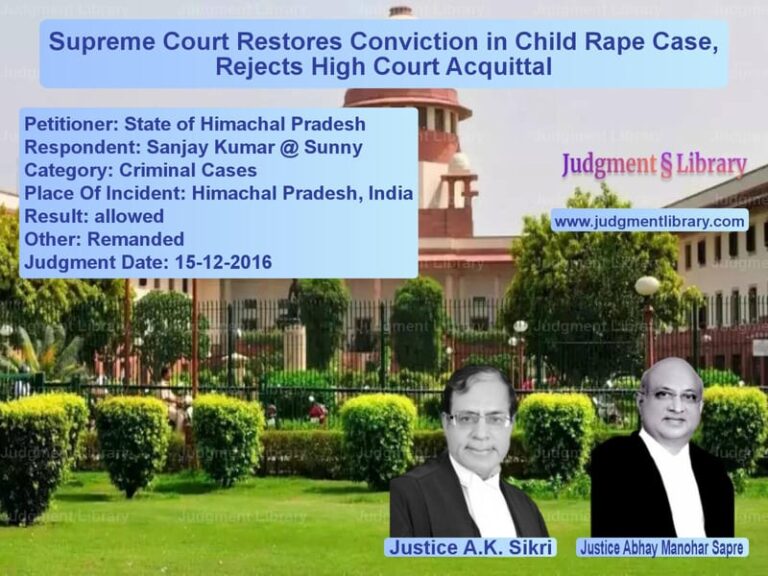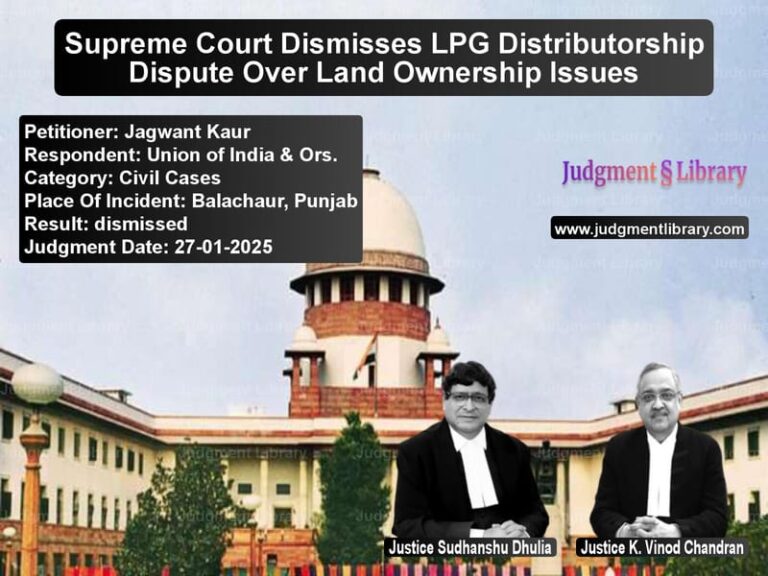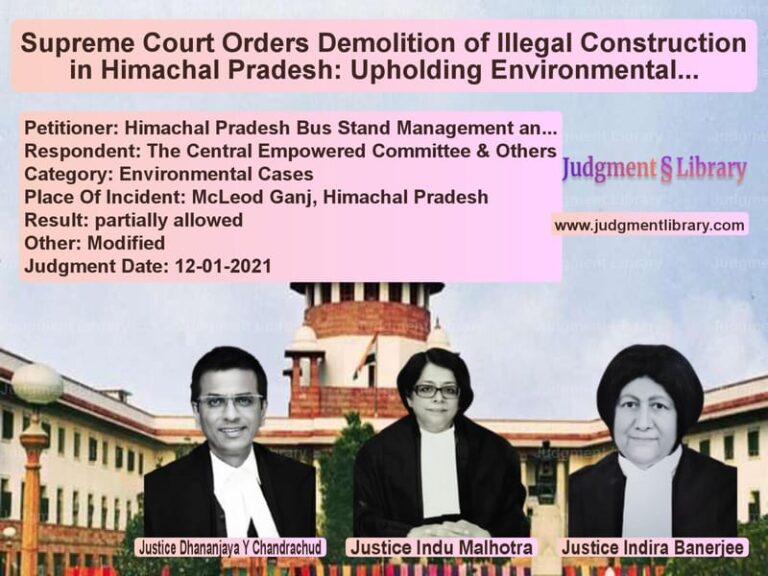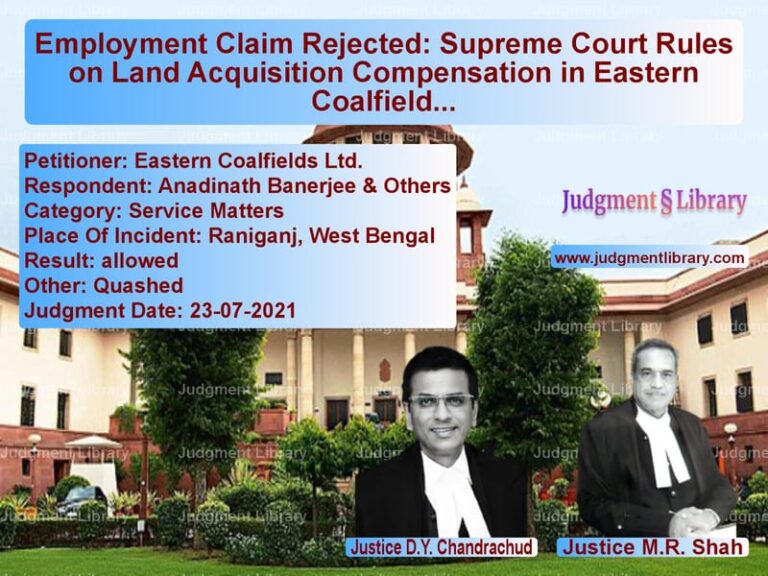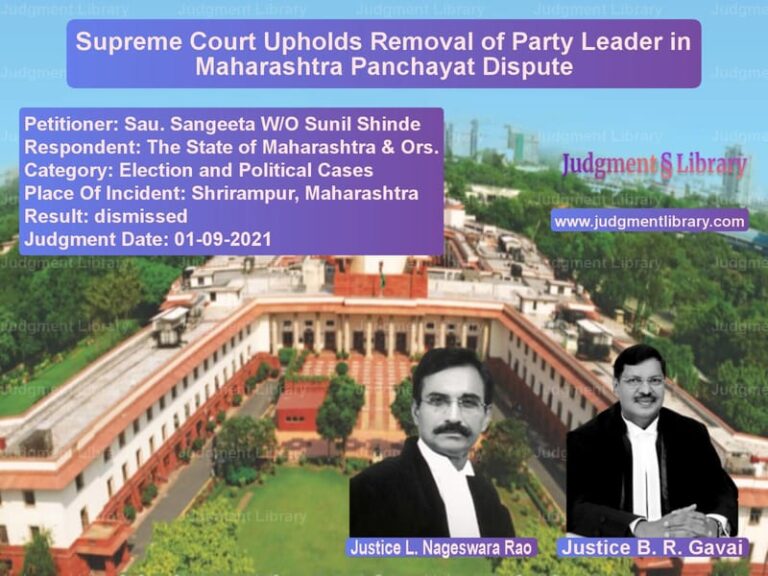Supreme Court Rejects Specific Performance Suit Due to Limitation Period Expiry
The Supreme Court of India, in Indian Evangelical Lutheran Church Trust Association v. Sri Bala & Co., ruled that a second suit for specific performance of a sale agreement filed after nine years from the rejection of the first suit was barred by limitation. The Court set aside the Madras High Court’s order and directed the rejection of the plaint under Order VII Rule 11(d) of the Civil Procedure Code (CPC).
Background of the Case
The case pertained to a 5.05-acre property known as Loch End in Kodaikanal, which was originally purchased in 1912 by American missionaries associated with the Lutheran Church Missouri Synod. In 1975, the property was transferred to the Indian Evangelical Lutheran Church Trust Association (the appellant) under a trust agreement.
On April 26, 1991, the appellant entered into an agreement with Sri Bala & Co. (the respondent) to sell the property for ₹3.02 crore, with an advance of ₹10 lakh paid upfront. The agreement included a condition that the property’s tenants would be evicted before completing the sale.
The respondent filed an unnumbered suit in 1993 seeking specific performance of the sale agreement. However, the plaint was rejected in 1998 due to non-payment of court fees. The respondent did not appeal against this rejection.
In 2007, the respondent filed a second suit for specific performance of the same agreement, claiming that time for performance was extended due to pending litigations with the tenants.
The appellant sought rejection of the plaint under Order VII Rule 11(d) CPC on the ground that the suit was time-barred under Article 54 of the Limitation Act, 1963, which prescribes a three-year limitation period.
Arguments by the Appellant (Indian Evangelical Lutheran Church Trust Association)
- The appellant contended that since the first suit was filed in 1993, the limitation period commenced from that date.
- Even if the limitation period were extended to three years from the rejection of the first suit in 1998, the second suit filed in 2007 was still barred by limitation.
- The alleged extension of time for performance was not mentioned in the first suit, indicating that the claim was an afterthought.
- The second suit was a misuse of the legal process and an attempt to keep the litigation alive indefinitely.
Arguments by the Respondent (Sri Bala & Co.)
- The respondent argued that under Order VII Rule 13 CPC, the rejection of the first suit did not bar the filing of a fresh suit.
- Time for performance was extended due to litigations involving the tenants, as evidenced by a letter dated July 15, 1991.
- The question of limitation was a mixed question of fact and law that should be decided during trial and not at the stage of rejection of plaint.
Supreme Court’s Observations
- “The right to sue first accrued in 1993, when the first suit was filed. The rejection of the plaint in 1998 did not extend the limitation period indefinitely.”
- “If the second suit were genuinely based on an extended time for performance, the first suit in 1993 should not have been filed at all.”
- “The absence of any reference to the July 15, 1991, letter in the first suit and its sudden appearance in the second suit raises doubts about its authenticity.”
- “Under Article 113 of the Limitation Act, a fresh suit after the rejection of the first suit must be filed within three years from the date the right to sue accrued. The second suit was filed nine years later and is therefore barred.”
Final Judgment
- The Supreme Court rejected the plaint in O.S. No.49/2007 under Order VII Rule 11(d) CPC.
- The orders of the Madras High Court and the trial court were set aside.
- The Court directed that the second suit should not proceed further as it was barred by limitation.
Conclusion
This judgment reinforces the principle that a party cannot indefinitely extend the limitation period by filing successive suits. The ruling clarifies the application of Article 54 and Article 113 of the Limitation Act and ensures that legal proceedings adhere to statutory timelines.
Read also: https://judgmentlibrary.com/supreme-court-ruling-on-stamp-duty-valuation-in-property-transactions/
Petitioner Name: Indian Evangelical Lutheran Church Trust Association.Respondent Name: Sri Bala & Co..Judgment By: Justice B.V. Nagarathna, Justice Nongmeikapam Kotiswar Singh.Place Of Incident: Kodaikanal, Tamil Nadu.Judgment Date: 08-01-2025.
Don’t miss out on the full details! Download the complete judgment in PDF format below and gain valuable insights instantly!
Download Judgment: indian-evangelical-l-vs-sri-bala-&-co.-supreme-court-of-india-judgment-dated-08-01-2025.pdf
Directly Download Judgment: Directly download this Judgment
See all petitions in Specific Performance
See all petitions in Property Disputes
See all petitions in Judgment by B.V. Nagarathna
See all petitions in Judgment by N. Kotiswar Singh
See all petitions in allowed
See all petitions in Quashed
See all petitions in supreme court of India judgments January 2025
See all petitions in 2025 judgments
See all posts in Civil Cases Category
See all allowed petitions in Civil Cases Category
See all Dismissed petitions in Civil Cases Category
See all partially allowed petitions in Civil Cases Category


